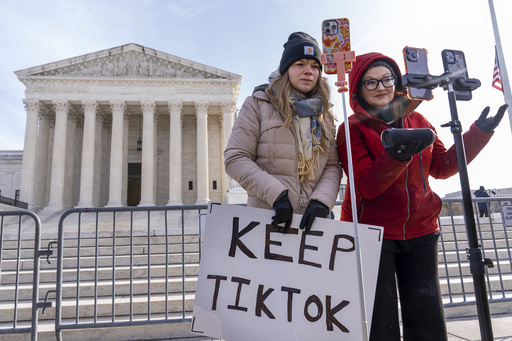
The Supreme Court has unanimously upheld a federal law banning TikTok starting Sunday unless its China-based parent company, ByteDance, sells the app.
The court ruled that national security risks tied to the app’s Chinese ownership outweigh concerns about free speech for its 170 million U.S. users.
TikTok Faces an Uncertain Future
A sale of TikTok appears unlikely before the ban takes effect on January 19. While the app won’t vanish from current users’ phones immediately, new downloads and updates will be blocked, rendering it increasingly unusable over time. The Justice Department has confirmed that the lack of updates will make the app nonfunctional.
The decision comes as President-elect Donald Trump promises to negotiate a solution, while the outgoing Biden administration signals it won’t enforce the law on its last full day in office. Trump, a TikTok user with 14.7 million followers, has taken a different stance than many Senate Republicans, who blame ByteDance for failing to secure a buyer.
The Legal and Political Battle
TikTok has long denied allegations that it poses a security threat. However, bipartisan majorities in Congress passed the ban, citing concerns about data collection and potential manipulation by the Chinese government. Solicitor General Elizabeth Prelogar argued that ByteDance might reconsider its refusal to sell if the law takes effect.
The Supreme Court’s unsigned opinion emphasized Congress’s determination that TikTok’s ties to China justify the drastic measure. Justice Neil Gorsuch acknowledged the severity of the remedy but pointed to the potential risks of China accessing sensitive data from millions of Americans.
Challenges to a Sale
TikTok’s parent company faces hurdles, as Chinese law restricts the sale of its proprietary algorithm. Despite some interest from U.S. investors, including former Treasury Secretary Steven Mnuchin and billionaire Frank McCourt, no deal has materialized.
TikTok’s legal team argued the app’s algorithm drives its success and would be difficult to replicate. However, critics like Sen. Tom Cotton see TikTok as a “communist spy app,” reinforcing the urgency of action against its Chinese ownership.
Broader Implications
The ban underscores the growing geopolitical tensions between the U.S. and China. While TikTok maintains there’s no evidence of Beijing using the app for espionage or manipulation, the U.S. government remains unconvinced.
As TikTok prepares for the impending restrictions, the broader debate highlights how technology and national security concerns are shaping global relations.